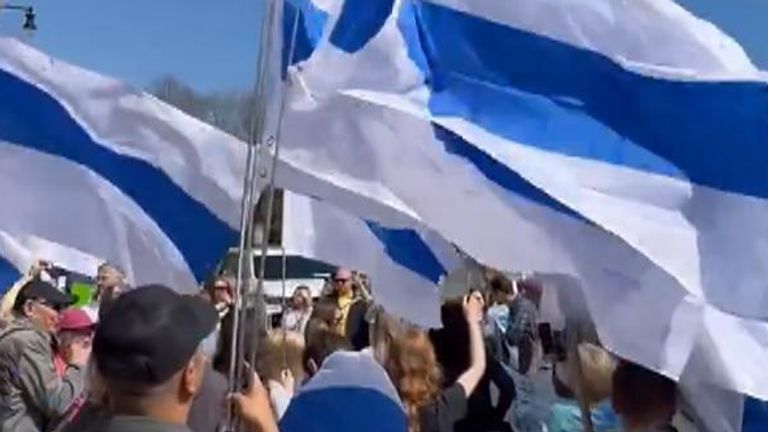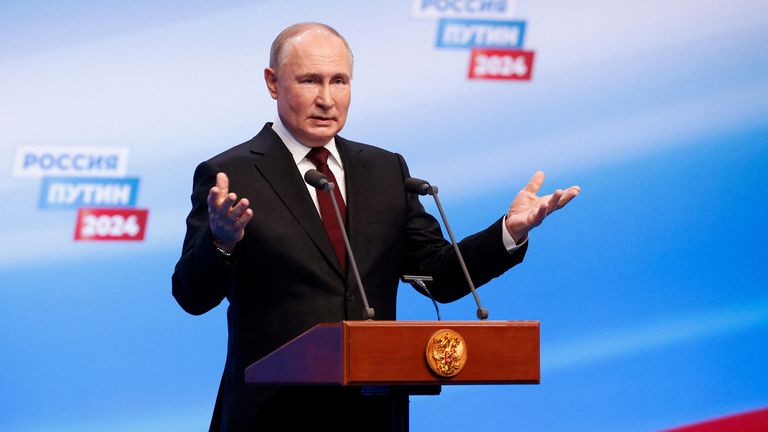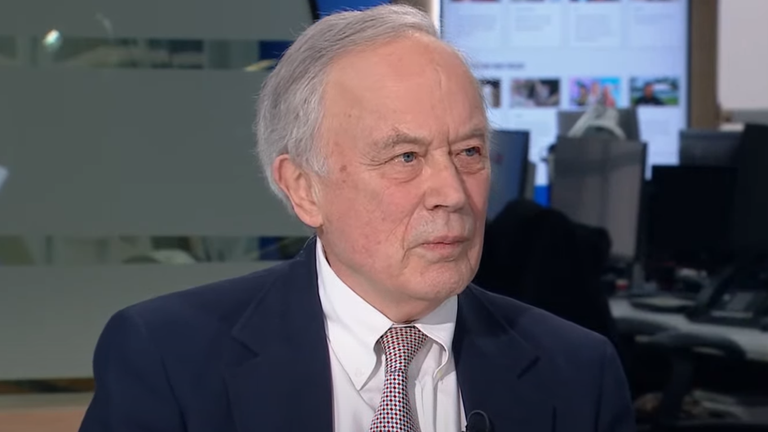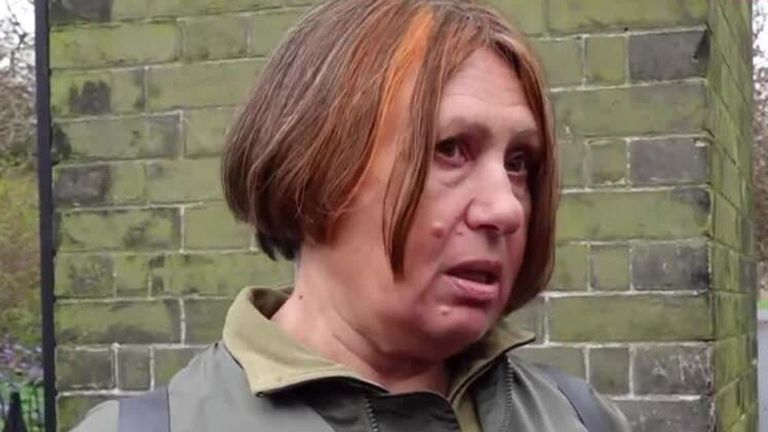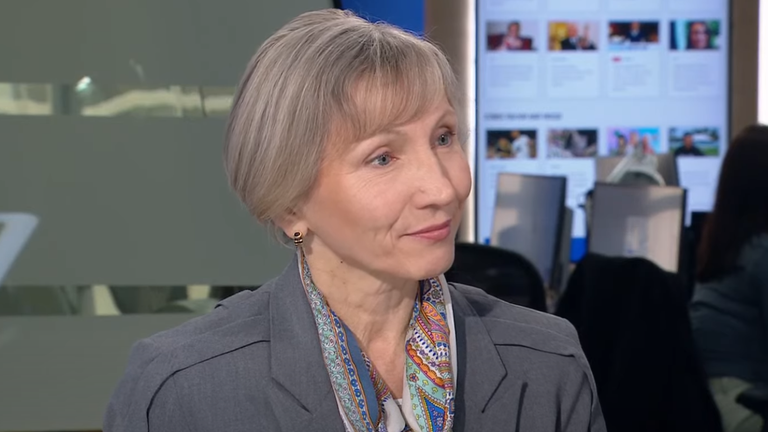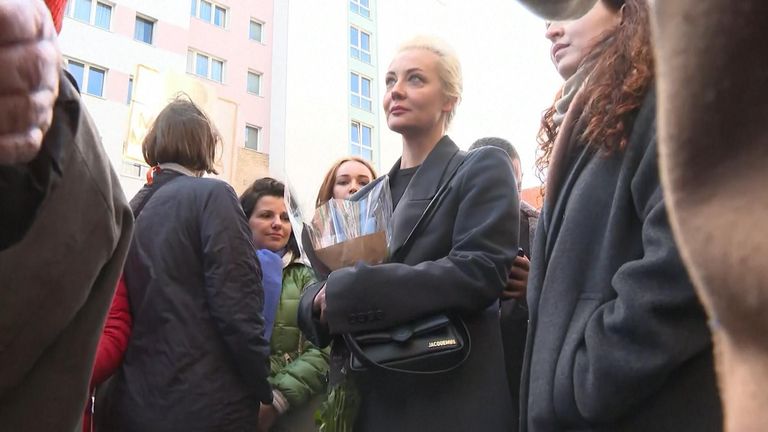Reaction to Putin's election win - including former ambassador who says Stalin would be 'insulted' by Putin comparison
Former British ambassador to Russia, Sir Andrew Wood, also said Vladimir Putin had created a regime "which is now interested primarily in violence and bad blood".
Monday 18 March 2024 18:54, UK
Joseph Stalin would find comparisons to Vladimir Putin "insulting", a former British ambassador to Russia has told Sky News.
It comes as Marina Litvinenko, the widow of poisoned former FSB agent Alexander Litvinenko, also praised the spirit of protestors who demonstrated against the Russian president ahead of the confirmation of his election victory.
On Monday, Mr Putin claimed a comprehensive win and a record fifth term in office in an election where victory was never in doubt.
Russia-Ukraine war latest: Election most corrupt 'in Russia's history'
He claimed the result, which came amid a crackdown on any genuine opposition, showed the Russian people had "trust" and "hope" in him.
Former British ambassador to Russia, Sir Andrew Wood - who has experience of life in Russia - said there were "no surprises".
"It wasn't an election in a real sense of the word, because there's only one candidate and there was a good deal of force to persuade people they had to go and sign up for him," he told Sky News.
He was also asked about comments by the UK's Defence Secretary, Grant Shapps, who said Mr Putin was like a "modern-day Stalin".
"I think it's rather insulting to Stalin because Stalin was operating a vile and bloodthirsty regime, but it was a regime with organisation," Sir Andrew said.
"The way that Russia is now governed by Putin is not a proper regime in the sense of it's not organised in any way except you have to do what Putin is telling you."
Sir Andrew also said he believed that, while Mr Putin would do his best to avoid further conscription in the war with Ukraine, he expected it to continue following his re-election.
Asked about his feelings towards the people of a country he lived in as an ambassador for five years, he said: "With pity, I think, putting it crudely.
"Putin is a traitor to his country. He's created something which is now interested primarily in violence and bad blood.
"The people of Russia, because they are in war, they don't want to lose, they don't want to be humiliated, and that's very understandable.
"But they're very decent people, it's notable how many fled and now live among us. They're not so stupid as to believe that whatever he [Putin] says has got to be the attitude of everybody in Russia."
Litvinenko's widow: Protests are 'beautiful'
Another to criticise the election was Marina Litvinenko, the widow of former FSB agent Alexander Litvinenko, who died in November 2006 after being poisoned with radioactive polonium in London.
On his deathbed, Mr Litvinenko accused Mr Putin of ordering his poisoning.
"First of all, we have to accept it was an event in Russia, but we should not call it an election," Ms Litvinenko told Sky News.
"Even the numbers we discussed [with] how many people voted for Putin, it doesn't matter, it would be definitely this number. This was all organised from the very beginning."
However, she said that one thing had given her hope, a series of protests against Mr Putin held both inside and outside of Russia.
They were led by the widow and supporters of Alexei Navalny - a chief critic of the Russian president - who died in prison in the run-up to the election.
"We are witnessing something unusual, that never happened before," she said.
"Thousands and thousands of people went outside of embassies all around the world and inside of Russia to show they are against Putin.
"I think this was not, of course, damaging for Putin, but it was very special to see people inside of Russia and outside of Russia doing something they believed - they are not for Putin, they're against Putin.
"This protest is beautiful and we all here in the West, we can see people against Putin, but it doesn't change Putin's regime."
As for why those inside Russia had not protested, she said: "People inside of Russia are very... scared to say anything. It's like Stockholm syndrome, they are just trying to live their life.
"But the people who went to this protest finally, they are not frightened. Even though they could not do something very strong, at least they can show they are against Putin's regime."
Reaction of political leaders
Around the world, the reaction to Mr Putin's re-election has been mixed.
China's President Xi Jinping joined North Korean leader Kim Jong Un - whose regime has supplied weapons to Russia in its war in Ukraine - in congratulating the Russian president.
India's prime minister Narendra Modi, whose country is part of the BRICS economic group involving Russia, congratulated Mr Putin on his election victory, adding he looked forward to strengthening New Delhi's "time-tested special and privileged strategic partnership" with Moscow.
Iran's president, Ebrahim Raisi, accused by the West of supplying weapons to Russia, also congratulated Mr Putin, stressing his country's desire for further expansion of bilateral relations with Moscow.
But France's foreign ministry said the election was not free or democratic and took place in the context of repression in a civil society.
In a statement, it hailed the courage of "the many Russian citizens who peacefully protested against this attack on their fundamental political rights".
Lithuania's foreign minister had a similar reaction, saying Mr Putin's victory lacked legitimacy as it occurred in an "atmosphere of non-freedom".
In the UK, Foreign Secretary Lord Cameron said Mr Putin's government was seeking "to silence any opposition to his illegal war" in Ukraine.
He added: "Putin removes his political opponents, controls the media, and then crowns himself the winner. This is not democracy."
Be the first to get Breaking News
Install the Sky News app for free


Read more from Sky News:
How Russians protested the election
Putin extends his rule - so what's next?
Lord Cameron cited "widespread reports of electoral violations", including independent observers not being invited and any candidates who opposed the war in Ukraine being "swiftly disqualified".
"The death of Alexei Navalny just weeks before the election was a tragic reminder of the severity of political repression in Russia today," he added.
Liberal Democrat leader, Sir Ed Davey, said in a post on X: "What happened in Russia was not an election. Putin 'won' without real competition. His serious opponents have either been jailed or killed.
"UK should seize frozen Russian money in the UK, and use it to support Ukraine's fight against Putin."
